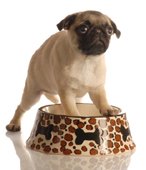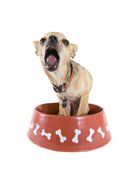 |
 | 
|
Dog DehydrationOne Solution: Use A Portable Dog Water BowlDog dehydration is more common (and more serious) than you may know. Understand your dog drinking water needs and make sure you provide it with an automatic dog waterer, or portable dog water bowl, or dog water fountain to supply regular, fresh and daily water. Dog dehydration can be a very serious situation. You read those stories about someone leaving their pup in a hot car and how devastating the results can be, and you see that dogs, just like people, need hydration. Without treatment, dog dehydration can cause death. And sadly, without understanding the consequences, some owners limit their dog's water because they are away from home (at work or school or ...) and they think that by giving their canine less water, he or she wont urinate inside the home. The consequences can be significant to your dogs health, particularly if this is the day-to-day treatment of your pet. That may sound dramatic, but the truth is that many pet owners dont realize how easy it is for their canine to become dehydrated. The good news is that there are some great ways at home and on the road to make sure your pet is healthy and well watered. Products like a dog water fountain, automatic dog waterer, and a portable dog water bowl for people who like to jog with their pets will all do the trick nicely. Causes of Dehydration in CaninesA common dehydration and over-heating problem occurs by leaving your pet in the car. When shopping or running errands, some owners take their dogs with them and leave them in the car on a hot summer day while they run inside the store to do some shopping - when they come out of the store a couple of hours later, their pet is in serious distress or dead. Temperatures inside cars can become unbearably hot. When your pet is sick, provide more water. Water not only hydrates but also helps to flush toxins and infections from the canine's body. Fluids are also necessary to prevent dehydration caused by fevers and/or vomiting. Many pet owners do not realize how much water their pet needs to drink; they think one bowl a day is plenty. Unlike food bowls, water bowls need to be kept full throughout the day. If you are away from home, then buy an automatic dog waterer or water fountain to provide water on-demand. Fluids are not optional, they are necessary for your canine's health. Understanding Dog DehydrationIn simplest terms, dehydration occurs when the body loses too much fluid. Along with that, the electrolyte content in the body drops (from minerals like sodium and potassium). One of the most common reasons for dehydration is excessive heat. This is very hard on dogs because they dont have sweat glands. Instead they pant to try and keep cool. Panting is your dog's signal to tell you 'I'm HOT'. There are several things other than heat that cause dehydration. These include:
Dog Drinking Water NeedsFresh water is the best partner you have in preventing dehydration in your canine. Keep fresh water in the house all the time. If your canine is outside a lot, consider a dog water fountain or an automatic dog waterer so that your pet has on-going access to the liquid he or she needs. Obviously, this is most essential during hot months. The average daily water needs for a canine weighing 20 lbs or less is about 12 ounces (or a cup and a half); for dogs over 20 lbs - somewhere between 3 and 8 cups of water a day is necessary (depends on diet, exercise, weight, etc.). The best approach to dehydration is to also have fresh water put out for your pet and refill as it empties. Using automatic waterers or water fountains that provide continuous water flows are a good way of supplying your pet's need for fluids. Dog Dehydration: TreatmentEven the most diligent pet owner may face a moment when they realize their pet has become dehydrated. Here are some signs of dehydration to watch for:
If you fear that your canine has not had enough liquids, this is not the time to present TONS of water. The canine will need to take in a little at a time or theyll get sick. Letting them lick an ice cube is one solution that meters the amount of water theyre getting. Alternatively, you can give them something like Pedialyte (often found in the baby food section of stores or drug stores) to boost the electrolytes in their system. Again, this has to be provided slowly and given in the right quantity (2-4 cc per body weight). If your pet refuses to drink, get them to the veterinarian quickly. They may need an IV to re-hydrate and return to health. Dog dehydration can have serious, deadly, results if undiagnosed and left untreated. Canines need water, and they need water in particular during hot summer days. Make sure that your pet has enough water daily, and particularly that you plan ahead and leave water for your canine while you're off at work or away from your home. Unfortunately dehydration in dogs is an all too common issue. Return to top of Dog Dehydration. Return to The Dog Biscuit Home Page. |  Related Articles
Dog Health Info This section contains articles about dog health info. Each of these articles are meant to give you information about your beloved pooch. Dog Health Dog health and nutrition go hand in hand. Choosing the right diet for your pet is very important. Bad Dog Breath Does your dog's bad breath signal more serious health issues? Canine Ear Infection: Can be Painful and Serious Is your pet shaking its head or scratching its ear? What are dog ear infection symptoms and treatments? Canine Health: How Diet Affects Oral Health Did you know that a very important matter in canine health is taking proper care of your dog's mouth. Just like with us humans, proper oral care for your pet results in good general health. Canine Kennel Cough is a Serious Dog Sickness Coughing, fever, lethargy are just some of the symptoms of dog kennel cough. Find out more about symptoms and treatments. Dogs and Chocolate Chocolate is poisonous for dogs. Learn what to do if your canine eats chocolate. Dog Bad Breath If your pooch has bad breath, don't ignore it. Bad breath, or halitosis, can be a signal of other health issues. Dog Bladder Infection Make sure you know what the symptoms are of this common dog illness; and how to treat it. Dog Dehydration Water is a very important part of your dog's daily diet; understand the consequences of dehydration. Dog Depression Depression in your canine is more common than you might think; and more serious. Dog Ear Infection Treatment Ear infections in dogs is quite common; prevention is the best remedy. Dog Losing Weight: Is this Good or Bad? If your pet is losing weight too fast, it can be a signal of a serious health issue. Check it out. Dog Weight Control: It's Important for Your Pet If your canine is gaining weight or is pudgy and out of shape, you need to improve its diet. Dog Seizure Dog seizures can be a signal of poisoning or other serious dog illnesses. Dog Skin Conditions What causes dog skin irritations? How can you make your canine's skin healthy? Overweight Dogs Overweight in an animal can cause (or be a symptom of) serious health issues. Provide your canine with a good diet. Probiotics for Dogs Probiotics are life supporting bacteria, they can help improve your dog's overall health. Sick Dog Symptoms Is your pooch sick? What are the symptoms, causes and treatment for illness in your pet? Toxic Foods for Dogs What foods are dangerous to your pet? How to identify symptoms of poisoning in dogs? Yeast Infection - Dog Can dogs get yeast infections? How to identify and treat? | |
|
Enjoy This Site?
Then why not use the button below, to add us to your favorite bookmarking service?    | ||
|
| Home | About
| Contact | Sitemap
| What's New
|Privacy Policy |
This site is for informational purposes only. If you have an issue with your dog's health, please see your vet.
Website design by Webmidwife.com | ||
| | ||





